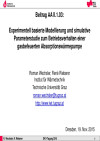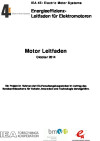Suchergebnisse
IEA EBC Annex 64: Simulation Based Multi-Criteria Evaluation Of Design Scenarios For An Industrial Waste Heat Based Micro District Heating Network Supplying Standard And Low-Energy Buildings (2017)

Dieser Beitrag stellt die Ergebnisse einer Multi-Kriterien-Bewertung unter
Berücksichtigung ökologischer, energetischer und ökonomischer Indikatoren
verschiedener Designszenarien für den Fall eines Mikrowärmenetzwerks in
Wien vor.
C. Marguerite, R.R. Schmidt, N. Pardo-Garcia and R. Abdurafikov
Herausgeber: Energy Procedia, Vol. 116, pp. 128-137
Englisch, 10 Seiten
IEA HPT Annex 43: Experimentell basierte Modellierung und simulative Parameterstudie zum Betriebsverhalten einer gasbefeuerten Absorptionswärmepumpe (2015)

Mittels eines validierten Modells einer Gasabsorptionswärmepumpe wurden Parameterstudien zum Einfluss verschiedener Freiheitsgrade sowie diverser, den Desorber betreffenden, Annahmen auf die Effizienz durchgeführt. Präsentation mit 29 Folien.
Roman Wechsler, René Rieberer
Herausgeber: Proc. Deutsche Kälte- und Klimatagung, Dresden
Deutsch, 29 Seiten
Downloads zur Publikation
Design and operation of ventilation in low energy residences - A survey on code requirements and building reality from six European countries and China

Im Rahmen des IEA EBC Annex 68 wurden Stakeholder aus der Lüftungs- und Baubranche aus acht Ländern zum Stand der Technik, zu Hürden und möglichen Verbesserungsansätzen interviewt. Dieser Konferenzbeitrag präsentiert erste Ergebnisse.
Maria Bocanegra-Yanez, Gabriel Rojas, Daria Zukowska-Tejsen, Esfand Burman, Guangyu Cao, Mathieu Pierre Yves Hamon, Jakub Kolarik
Herausgeber: Air Infiltration and Ventilation Centre (AIVC)
Englisch, 10 Seiten
IEA 4E: Energieeffizienz-Leitfaden für Elektromotoren

Motor Leitfaden - Oktober 2014
K. Kulterer
Herausgeber: Österreichische Energieagentur
Deutsch, 46 Seiten
Downloads zur Publikation
IEA EBC Annex 71: Building energy performance assessment based on in-situ measurements - Final Reports (2021)

Die vier Endberichte des IEA EBC Annex 71 über die Bewertung der Gebäudeenergieeffizienz mit Hilfe optimierter in situ Messverfahren wurden veröffentlicht und sind hier zusammengefasst.
Richard Fitton (Main Author)
Herausgeber: KU Leuven / 2021
Englisch, 135 Seiten
IEA AFC Annex 31: Studie "Simulation-Assisted Determination of the Start-Up Time of a Polymer Electrolyte Fuel Cell" (2021)

Diese Publikation untersucht die Wasserstoffverteilung und das Risiko der Unterversorgung während des Anfahrens und nach der Stickstoffspülung, indem ein bestehendes computergestütztes fluiddynamisches Modell erweitert wird, um das instationäre Verhalten zu erfassen.
Merit Bodner, Željko Penga, Walter Ladreiter, Mathias Heidinger, Viktor Hacker
Herausgeber: MDPI, Energies 14, 2021
Englisch, 20 Seiten
IEA AFC Annex 35: Paper "Cobalt-modified palladium nanocatalyst on nitrogen-doped reduced graphene oxide for direct hydrazine fuel cell" (2021)

Stickstoffdotierte reduzierte Graphenoxid-gestützte Palladium-Kobalt-Nanopartikel werden synthetisiert und als leistungsstarker und kostengünstiger anodischer Katalysator für direkte Hydrazin-Wasserstoffperoxid-Brennstoffzellen verwendet.
Mir Ghasem Hosseini, Vahid Daneshvari-Esfahlan, Sigrid Wolf, Viktor Hacker
Herausgeber: RSC Advances 62, 2021
Englisch, 10 Seiten
Webinar - Blockchain Applications: an Energy Perspective
12. April 2022
Via Zoom, Paris, FR
This webinar will illustrate how blockchains work, how cryptocurrencies and other applications employ the blockchain, and why the resulting energy consumption is so high. A potential solution to significantly reduce the energy consumption used for validation will also be presented.
IEA AFC Annex 31: On-site production of high-purity hydrogen from raw biogas with fixed-bed chemical looping (2022)

Die dezentrale Umwandlung von lokal verfügbaren, biogenen Ressourcen in nutzbare Sekundärenergieträger spielt eine entscheidende Rolle in der Transformation des Energiesystems. Biogas aus landwirtschaftlichen Reststoffen und dessen Umwandlung in Wasserstoff als universeller Energieträger ist ein vielversprechender Weg, um ungenutzte chemisch gebundene Energie in das Energiesystem zu integrieren.
B. Stoppacher, T. Sterniczky, S. Bock, and V. Hacker
Herausgeber: Energy Conversion and Management, 2022
Englisch
IEA EBC Annex 80: Paper "Performance evaluation of balanced heating and cooling with hydronic ceilings and floors" (2022)

Leistungsbewertung hydronischer Decken- und Bodensystemen für balanciertes Heizen und Kühlen
Herausgeber: CLIMA 2022 REHVA 14th HVAC World Congress (22. – 25. May 2022, Rotterdam, The Netherlands)
Englisch
IEA AFC Annex 31: A Review of Accelerated Stress Tests for Enhancing MEA Durability in PEM Water Electrolysis Cells (2023)

In dieser Übersicht werden die verschiedenen beschleunigten Stressfaktoren für die Hauptkomponenten der MEA erörtert und die jüngsten Veröffentlichungen von beschleunigten Stresstests (ASTs) bei der Untersuchung der Lebensdauer von PEMWE-Zellen zusammengefasst. Darüber hinaus wird ein kurzer Überblick über die Degradationsmechanismen für die einzelnen MEA-Komponenten gegeben, die in den jüngsten Veröffentlichungen beschrieben wurden. Die verschiedenen Aspekte, die in dieser Übersicht identifiziert wurden, dienen als Roadmap, um die Lebensdauer neuartiger Stackmaterialien weiter zu verbessern.
Eveline Kuhnert, Viktor Hacker und Merit Bodner
Herausgeber: International Journal of Energy, 2023
Englisch, 23 Seiten
Policy Brief 1: Motor Systems Tool for efficient system design

Die Kurzfassung stellt das Motor Systems Tool zum Design von effizienten Motorsystemen vor.
Chapter 11: Integration of a membrane reactor with a fuel cell

Der Effekt von Verunreinigungen in den zugeführten Gasen auf den Betrieb der Polymer-Elektrolyt-Membran-Brennstoffzelle wird diskutiert. Der Schwerpunkt wurde dabei auf die Vermeidung dieser gelegt.
Mehrsprachig
Benchmarking Bericht - Verbaute Flüssigkeitskühlsätze

Diese Analyse vergleicht die Mindestanforderungen und Testmethoden für verbaute Flüssigkeitskühlsätze zur Entwicklung von politischen Strategien (Policies).
Grid-forming inverters - Validation and testing challenges
15. March 2024
AIT Austrian Institute of Technology, Giefinggasse 2, Wien, AT
The proposed workshop is testing-originated and presents methodologies-related research activities, entailing the design and optimization of interfacing methods that are dedicated to the robust and high-fidelity PHIL testing of GFC with soft black start capability.
IEA AFC Annex 31: Recent advancements in chemical looping water splitting for the production of hydrogen (2016)

Die Publikation evaluiert die wissenschaftlichen Veröffentlichungen zum Thema Wasserstoffherstellung mittels chemical looping Verfahren in den letzten Jahren.
Herausgeber: RSC Advances/Royal Society of Chemistry
Englisch, 30 Seiten
Downloads zur Publikation
IEA AFC Annex 35: Challenges in flow field manufacturing, testing and simulation for PEM fuel cells (2019)

Dieser Abstract behandelt die Herausforderungen, die bei der Herstellung, der Testung und der Simulation von Polymerelektrolytmembran Brennstoffzellen entstehen können.
B. Marius, V.Hacker
Herausgeber: Interdisciplinary Endeavour in Technology at Nanoscale, Water and Environment. University of Split: STIM-REI, 2019
Englisch
IEA AFC Annex 35: Automatisierte Herstellung von Hochleistungselektroden für Niedertemperatur-Brennstoffzellen (2018)

In diesem Artikel wird die automatisierte Herstellung von Hochleistungselektroden für Niedertemperaturbrennstoffzellen mit geringen Platingehalt mittels Ultraschallsprühbeschichter beschrieben.
Grandi, M., Stark, A. & Hacker, V.
Herausgeber: CEET konkret, pp. 28-29., 2018
Englisch, 2 Seiten
Downloads zur Publikation
IEA IETS Annex 15: Techno-economic aspects of increasing primary energy efficiency in industrial branches using thermal energy storage (2021)

Thermische Speicher (TES) werden hinsichtlich ihrer techno-ökonomischen Charakteristiken analysiert. Der energetische und exergetische Wärmebedarf nach Temperatur wird für die österreichischen Industriebranchen bewertet. Im Zuge einer Case Study wird ein TES für die Abwärmeauskopplung aus einem Zementwerk ökonomisch bewertet.
Stefan Puschnigg, Johannes Lindorfer, Simon Moser und Thomas Kienberger
Herausgeber: Energieinstitut an der JKU Linz, Montanuniversität Leoben
Englisch
IEA EBC Annex 80: Paper - Resilient cooling strategies - a critical review and qualitative assessment (2021)

Wissenschaftliches Review Paper zum Thema resiliente Gebäudekühlung
Chen Zhang, Ongun Berk Kazanci, Ronnen Levinson, Per Heiselberg, Bjarne W. Olesen, Giacomo Chiesa, Behzad Sodagar, Zhengtao Ai, Stephen Selkowitz, Michele Zinzi, Ardeshir Mahdavi, Helene Teufl, Maria Kolokotroni, Agnese Salvati, Emmanuel Bozonnet, Feryal Chtioui, Patrick Salagnac, Ramin Rahif, Shady Attia, Vincent Lemort, Essam Elnagar, Hilde Breesch, Abantika Sengupta, Liangzhu Leon Wang, Dahai Qi, Philipp Stern, Nari Yoon, Dragos-Ioan Bogatu, Ricardo Forgiarini Rupp, Taha Arghand, Saqib Javed, Jan Akander, Abolfazl Hayati, Mathias Cehlin, Sana Sayadi, Sadegh Forghani, Hui Zhang, Edward Arens, Guoqiang Zhang
Herausgeber: Energy and Buildings, Volume 251, 2021, Englisch
Englisch, 22 Seiten
